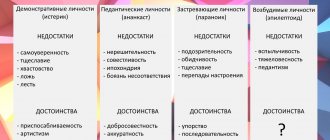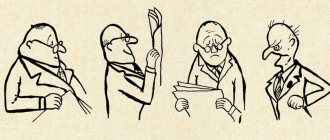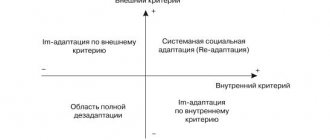Has your child become not himself? Are you no longer sure whether it’s just a matter of adolescence? Are you worried about the mental and physical state of your child? Are you thinking about taking him to a psychologist? Take your time. It is possible that your child is the most average teenager. I just ended up among those whose accentuations made themselves felt. Read on to find out what it is.
Accentuations occur in 50-80% of adolescents. In the adult population this percentage is much lower. This difference is due to the specifics of the ages. During puberty, the whole organism undergoes a restructuring, which cannot but affect the character.
M. Delyaman (19th century) was the first to study adolescent accentuations. He called such teenagers “easily losing their balance.” Later, K. Leonard introduced the term “accentuated personality,” which emphasized that we are talking about the norm, and not about pathology.
Why does adolescence deserve separate consideration within the framework of the problem of accentuations? There are 3 reasons for this:
- This is a critical period with an increased risk of developing psychopathy.
- Scientists have noted that types of accentuations become noticeable at different ages (some from birth, some only when entering school), which is due to specific dangerous situations for each type. That is, they will not manifest themselves until the right situation arises. At the same time, it is noted that in adolescence, full disclosure of all types occurs.
- The types that have developed before this age undergo serious changes, which are important to track.
The most complete classification of transient teenage accentuations is the differentiation of A. E. Lichko. I suggest you consider each type separately, through a description of its characteristics and critical situations, and the tendency to deviate behavior. You will also receive recommendations for interacting with each type.
Hyperthymic
Such children are noticeable from birth. They grow fast and are always cheerful and cheerful. True, provided that the environment does not oppose them. Otherwise, short bursts of aggression are possible. Such children easily get along with peers and adults, are talkative, don’t mind misbehaving, and are inquisitive.
These are resourceful and enterprising people. They tolerate high loads and hardships well. But it’s hard for them when idle. As they grow older, they try to join a peer group, where they usually become leaders. They master the educational material well, but due to frivolity they have unstable success.
Dangers
Hyperthymic teenagers are promiscuous in acquaintances and relationships (including sexual ones), sloppy and unnecessary. High risk of alcoholism. They have adequate self-esteem, but sometimes overestimate their capabilities.
As a rule, this is a clear accentuation.
- With an authoritarian (dictatorial) or, conversely, permissive (indulgent) style of education, an asocial orientation of the individual develops.
- With the “family idol” parenting style, a suicidal and hysterical orientation develops.
- With other destructive styles and negative external factors, violent insanity may develop.
Critical situations
Submission to discipline, isolation or contact with the environment under someone else's control, forced idleness, physical inactivity, supporting roles, subordination in a team, monotonous work.
Tendency to deviate behavior
Group offences, drunkenness, use of other psychoactive substances.
Recommendations for parents
It is necessary to go from the opposite (relevant for correction of all types) and create situations that are the opposite of critical ones. In this case - situations of initiative, leadership, casual communication on interests (circles, sections, meetings).
It is important to be friendly and open. There is no place for demands and orders in communicating with such a child. I'm not saying he should be lazy. Just don't order, just ask politely. As an equal partner. It is important to stick to the dialogue and not “chew” one topic for a long time.
Expressed control is unacceptable, but unobtrusive interest in the child’s life is necessary. Please note that hyperthymic children perfectly feel the formal attitude. So you need to be sincerely interested. The ideal is to find a common hobby.
Accentuations of character in adolescents article on psychology on the topic
Character accentuations in adolescents
Character is a unique combination of stable mental characteristics of a person that determine his typical individual behavior patterns in certain life conditions and situations. The uniqueness of a person’s character is manifested in the system of his relationships to reality: to other people (sociability - isolation, tactfulness - rudeness); to the point (responsibility - dishonesty, hard work - laziness); to oneself (modesty - bragging, pride - humiliation); to property (generosity - greed, frugality - wastefulness) ... Character is closely related to morals, beliefs and worldview. Thanks to this connection, character traits determine the social position of the individual. The relative stability of character does not exclude its high plasticity, which is of great importance for its purposeful formation.
Sometimes individual character traits become extremely sharp, so strongly expressed that they can become its weak link. Such extreme variants of normal character development are called accentuations.
Character accentuation is an extreme variant of the norm, in which individual character traits are excessively enhanced.
Character traits with accentuations may not appear all the time, but only under certain conditions, when the life situation places increased demands on the weakest link of character, and are almost not detected under normal conditions.
Adolescence is a period of character development—at this time, most characterological types are formed. It is at this age that character accentuations appear most clearly.
In adolescents, a lot depends on the type of character accentuation - features of behavioral disorders, acute affective reactions and neuroses. Studying the psychotype of a teenager gives teachers a real opportunity to anticipate and predict, to a certain extent, his behavior in a given situation. Knowing the characteristics of a teenager’s psychotype allows us to interact more optimally with him, help in the formation and development of his personality, without disturbing the natural beginning in every child. The work of a teacher with an accentuator mainly consists of correcting or building a special kind of relationship between the accentuator and others, taking into account the nature of his accentuation.
Hyperthymic type.
Main signs: Since childhood, hyperthymic adolescents are characterized by great mobility, excessive independence, a tendency to mischief, and a lack of a sense of distance in relation to adults. From the first years of life, they make a lot of noise everywhere, love the company of their peers and strive to command them. The main feature of hyperthymic teenagers is almost always a very good, even elated mood. Always in a good mood and high vitality create favorable conditions for reassessing your abilities and capabilities. Excessive self-confidence encourages you to “show yourself off,” to appear before others in a favorable light, and to boast. An uncontrollable interest in everything around makes hyperthymic teenagers indiscriminate in their choice of acquaintances. Contact with random people they meet is not a problem for them. Rushing to where “life is in full swing,” they can sometimes find themselves in an unfavorable environment and end up in an asocial group.
Strengths: sociability, activity, optimism, high vitality, generosity, lack of internal conflicts.
Weaknesses: superficiality, easy attitude to morality and laws, non-commitment, familiarity, frivolity, willingness to take unrestrained risks, rudeness (but without any evil).
Conflict situations:
- Strict regulation, strict compliance with disciplinary requirements;
- restriction of physical activity, forced idleness;
- severe limitation of communication, loneliness.
- monotonous environment, monotonous work requiring careful painstaking work;
Recommendations:
It is necessary to create conditions in which teenagers can be active. Therefore, the main task of the teacher is to provide useful directions for the application of children's strength and energy, i.e. to go not along the path of limiting activity, but along the path of its productive use. It is advisable to entrust leadership in the organization of affairs and entertainment, where speed, variety, and resourcefulness are required. Sports activities are especially useful. The most suitable sports include swimming, which reduces the excitability of the nervous system, and martial arts, which instill the skills of self-control and self-discipline.
Everyday obsessive care, constant moralizing and instruction, “working through” in front of others can only cause an increase in the “struggle for independence,” disobedience and deliberate violation of rules and regulations. Petty control is contraindicated in education, but lack of control is also unacceptable. Avoid being overly directive. It is better to conduct conversations at a lively and fast pace, without lingering on one topic for a long time, often transferring the initiative in the conversation to the teenager himself (they don’t like it when they “mumble”). Particular attention should be paid to maintaining a distance sufficient for productive interaction.
Preferred activity: work related to constant communication: organizational activities, sales service, sports, theater, etc.; prone to changing professions and places of work; I don’t like work that requires precision and systematicity.
Hysterical (demonstrative) type.
Main features: The main feature of this type is boundless egocentrism, an insatiable thirst for constant attention to one’s own person, admiration. At worst, even indignation or hatred directed at oneself is preferred, but not indifference and indifference—just not the prospect of remaining unnoticed. All other qualities of the hysteroid are fueled by this trait.
The desire to attract attention to oneself becomes an urgent need.
A pronounced tendency to repress facts and events that are unpleasant for him, deceit, fantasy and pretense used to attract attention, adventurism, vanity, “flight into illness” with an unsatisfied need for recognition.
Strengths: perseverance and initiative, sociability and determination, resourcefulness and activity, good organizational skills, independence and willingness to take charge, energy (although the hysteria quickly fizzles out after a burst of energy).
Weaknesses: sensitive to inattention, loss of comfort, a tendency to intrigue and demagoguery, deceit and hypocrisy, cockiness and recklessness, thoughtless risks (but only in the presence of spectators), taking into account only one’s own desires, clearly inflated self-esteem, touchiness (when he is personally offended) .
Conflict situations:
- situations that voluntarily or involuntarily hurt pride;
- situations of even some indifference on the part of the people around him, and even more so of deliberate ignorance of his personality (the need to attract attention to oneself can lead to a suicide attempt);
- criticism of achievements, talent or abilities;
- limited social circle, forced loneliness;
- situations of an absurd or funny situation;
- exposing, especially publicly, his inventions, and even more so ridiculing them.
Recommendations:
To establish contact, it is necessary to make the teenager feel that they are interested in him as an individual. Given the increased need for attention, it is necessary to find forms in which this need could be successfully satisfied.
Interaction with a teenager should be smooth, calm, businesslike, without much emphasis. Eliminate the atmosphere of adoration and unreasonable recognition. Positive assessments and rewards should be given selectively - only for real achievements and abilities.
Ignore all attempts to evade (for example, using illness) from work.
Preferred activities: working with constantly changing short-term contacts, acting.
Psychasthenic type.
Main features: The main features of the psychasthenic type are high anxiety, suspiciousness, indecision, a tendency to introspection and constant doubt, and a tendency to form ritual actions. In childhood, timid, fearful, prone to reasoning. In adolescence, they show indecision and anxious suspiciousness. Making a decision or making a choice is the most difficult task for them, and even after making a decision, long doubts and reflections about the correctness of the choice followed again. People of this type are born pessimists, fearing the future and expecting failures. Specially invented signs and rituals become protection against constant anxiety about the future.
Strengths: discipline, diligence, accuracy, seriousness, conscientiousness, prudence.
Weaknesses: sensitivity to various kinds of tests, indecisiveness, lack of initiative, a tendency to endless reasoning, soul-searching, the presence of obsessions and fears.
Conflict situations:
- situations when it is necessary to make independent decisions;
- situations of quickly switching from one activity to another;
- situations of performing tasks without clear directions and instructions;
- situations of intense anxiety or fear;
- situations of criticism of the teenager himself or his behavior;
- situations of prolonged physical or psychological overload.
Recommendations.
Pedagogical assistance for this is aimed at overcoming feelings of indecision, sometimes even inferiority, and complexes. It is necessary to help the teenager free himself from unfounded doubts and fears that significantly complicate his life. Therefore, when communicating, there is no need to constantly appeal to his sense of responsibility; it is necessary to support any positive initiative, and in no case should you ridicule or suppress the child’s initiative. It is necessary to provide the child with a feeling of success. He should only be compared with himself and praised for improving his own results.
Favorable situations are calm, pre-regulated work, when there is no need to make responsible decisions on your own. However, the teenager should be encouraged to make decisive statements, readiness to make decisions independently and subsequently act in accordance with them. Praise more often for successes, provide the opportunity to do more of what you love.
Preferred activities: individual activities; Leadership positions and professions associated with great responsibility are not recommended.
Epileptoid type.
Main features: The main features of the epileptoid type are viscosity of thinking, scrupulous pedantry, a tendency to an angry and melancholy mood with accumulating aggression, which manifests itself in the form of affects, attacks of anger and rage, and conflict. The affects are not only very strong, but also long lasting - the epileptoid cannot cool down for a long time. The reason for anger may be small and insignificant, but it is always associated with at least a slight infringement of interests. Leadership is manifested by the desire to dominate peers (which is most often achieved by physical force). Such children exhibit a childish thrift towards everything “of their own”; any attempts to encroach on their childish property can cause an extremely angry reaction.
Strengths: discipline, accuracy, thoroughness, frugality (often turning into excessive pedantry), reliability (always keeps his promises), punctuality, attention to one’s health.
Weaknesses: intolerance to a prolonged state of internal tension, excessive demands on others, cruelty, insensitivity to the grief of others, violent reaction against infringement of one’s interests.
Conflict situations:
- Limitation of independence
- Infringement of the rights and interests of a child,
- Remarks that hurt pride
- Losing in the game
- Promises that remain unfulfilled
- Changing established orders and rules,
- Limiting the opportunity to demonstrate your authority, your power over other people.
It is important to establish contact and mutual understanding with the child. Thoroughness and leisureliness, sensitivity and tact - this is what is required from an adult. This style of communication allows a teenager to form a socially acceptable model of behavior. It is most advisable to establish contact with a teenager outside of periods of affective tension, encouraging him at the beginning of the conversation to “speak out” on one of the topics that is most interesting to him. It is very important for such a teenager to find a suitable activity that distracts him from negative emotions, relieves stress, and it is advisable to involve him in sports. A benevolent advance of his future successes and encouragement of his real achievements, which help the teenager to assert himself, help a lot. Small groups can be assigned to lead. Since it is difficult for a child to switch from one activity to another, or to enter into any new activity, it is necessary to give him enough time to get involved in the work, without “pulling” or rushing. The number of switchings should be reduced as much as possible and you should not take too frequent breaks in classes.
Preferred activities: paramilitary structures, physical labor, manual labor, athletic sports; a job that provides guaranteed growth, a sense of independence and the opportunity to express yourself.
Labile type.
Main features: The main feature of the labile type is a sharp change in mood depending on the situation. Mood is characterized not only by frequent and sudden changes, but also by their significant depth. Well-being, appetite, sleep, ability to work, and the desire to be alone or only with a loved one, or to rush into a noisy society, in company, with people, depend on the mood of a given moment. Labile teenagers are “people of mood” and everything depends on their mood. The labile type is characterized by devoted friendship; they expect understanding and the ability to listen to them from a friend when they want to “cry into their vest.” Such children usually have only one friend. Praising such children is not harmful at all - it does not lead to arrogance. There is a great need for empathy.
Strengths: sociability, good nature, sensitivity and affection, sincerity and responsiveness (during periods of high spirits).
Weaknesses: irritability, short temper, weakened self-control, tendency to conflicts (during periods of depressed mood). Conflict situations:
- situations of strong competition;
- situations of infringement of self-esteem;
- situations of complete disharmony in his mood (everyone is having fun, but at this time he is suffering);
- situations of threat of punishment, fear of something or someone;
- emotional rejection from people significant to him,
- loss of loved ones or separation from those to whom one is attached.
Recommendations:
Since the need for sympathy and empathy is clearly expressed, appropriate empathic behavior of the teacher is desirable. As a rule, by demonstrating emotional responsiveness, sympathy and empathy, you can achieve what cannot be done by any other means or efforts.
As a rule, the teacher’s manifestation of empathy leads to the rapid establishment of a trusting relationship with the teenager, but one should take into account the child’s extreme emotional sensitivity, and as a result, high mood variability.
Establishing contact is possible if the teenager sees a friendly attitude towards himself and finds sympathy. Usually, after an emotional response, mental relaxation occurs; in this state, the child becomes available for productive contact.
Particular attention must be paid to their relationships with peers. It should be borne in mind that emotional support and empathy from others are important to him.
A labile teenager easily gets out of a depressed state with encouragement, consolation and the appearance of a pleasant prospect (even if not always real).
Preferred activities: creative pursuits, the arts, professions related to closeness to nature, medicine, education and training.
Sensitive type.
Main signs: increased impressionability, timidity, heightened sense of inferiority. Teenagers of this type are distinguished by excessive sensitivity and high moral demands on themselves. As children, they are timid, try to avoid excessively active games, prefer quiet games or games with children, and are very withdrawn among strangers. Extremely attached to family. They develop a sense of duty early, so they study very diligently, but are afraid of tests.
Strengths: kindness, calmness, attentiveness to people, sense of duty, high internal discipline, responsibility, conscientiousness, self-criticism, increased demands on oneself, the desire to overcome one's weaknesses.
Weaknesses: suspiciousness, fearfulness, isolation, a tendency to self-flagellation and self-deprecation, confusion in difficult situations, increased sensitivity and conflict on this basis. Internal self-doubt can be compensated by external bravado.
Conflict situations:
- ridicule or suspicion of unseemly behavior;
- unkind attention or public accusations.
Recommendations:
The main goal of pedagogical assistance is to gradually increase self-esteem and overcome feelings of inferiority.
It is not easy for them to establish contact, but their natural need to share their hidden experiences is quite strong. Therefore, it is necessary to conduct multiple conversations with detailed analysis and analysis of situations, helping adolescents to realize their suspiciousness and false sense of inferiority.
It is important to create situations of self-affirmation in those areas of activity where they can express themselves most fully and naturally. But at the same time, one should help to establish oneself in those areas where the teenager feels weakest. Create situations that stimulate the teenager’s conviction that others need him.
It is necessary to dose the loads, since children with this personality type are susceptible to asthenia. It is advisable to protect against overly strong impressions.
When communicating, excessive care and minute control over every step, every minute are contraindicated.
Preferred activity: work that does not require a wide range of communication.
Unstable type.
Main signs: Characterized by lack of will, which clearly appears when it comes to study, work, and performance of duties. In their search for entertainment, they also do not show assertiveness, but rather go with the flow. In childhood they are distinguished by disobedience, restlessness, getting into everything and everywhere, but at the same time they are cowardly, afraid of punishment, and easily obey other children. Basic rules of behavior are difficult to learn.
Usually they have no desire to learn. Only under direct and strict control, reluctantly obeying, do they carry out tasks, always looking for an opportunity to shirk classes. At the same time, an increased craving for entertainment, pleasure, idleness, and idleness is detected early.
Strengths: openness, speed of switching in business and communication, curiosity, sociability, goodwill.
Weaknesses: lack of will, craving for empty pastime, talkativeness, laziness, boasting, irresponsibility, cowardice.
Conflict situations:
- strict obedience to disciplinary requirements,
- the need for prolonged effort and concentration of energy on some work,
- the need to make specific decisions and bear responsibility for them.
- Limitation of communication with people who help you have fun.
Recommendations:
Providing pedagogical assistance to a teenager requires great patience, tact, systematicity and perseverance. The child cannot be left unattended; he must always be in sight (constant monitoring). A harsh, strictly regulated regime is needed. It is impossible to allow people to evade doing the assigned task, to exclude the possibility of evading work if everyone is busy. Idleness must be punished. When organizing education, it is advisable to coordinate the efforts of teachers and parents. Only with constant and concerted efforts can a positive result be obtained.
Weakness of will is one of the main traits of the unstable. It is weakness of will that allows them to be kept in an environment of a harsh and strictly regulated regime. When they are constantly being watched, they are not allowed to shirk from work, when idleness threatens with severe punishment, and there is nowhere to escape, and everyone is working around them - they resign themselves for a while. But as soon as guardianship begins to weaken, they immediately rush to the nearest “suitable company.” The weak point of the unstable is neglect, an atmosphere of connivance, which opens up space for idleness and idleness.
Preferred activity: professions that do not require effort, that independently set the work schedule (work from home, railway conductor, security guard, etc.).
Cycloid type.
Main signs: alternating phases of good and bad mood with different periods. In childhood, cycloids are no different from their peers, but with the onset of adolescence they experience the first subdepressive phase (subdepression is mild depression, which is characterized by a tendency to apathy, lethargy, and the feeling that everything is falling out of hand). During this period, cycloids begin to be burdened by society and the company, and their performance sharply decreases. Serious failures during the period of subdepression can cause an affective reaction and suicidal attempts.
The subdepressive phase lasts 2-3 weeks, after which the mood improves, the cycloids become hyperthymic in behavior and begin to make up for lost time during the subdepressive phase.
Strengths: initiative, cheerfulness, sociability during periods of good mood.
Weaknesses: inconsistency, imbalance, indifference, outbursts of irritability, excessive touchiness and pickiness towards others (during periods of high mood). Sadness, thoughtfulness, lethargy, loss of energy, difficulties in school and in life, irritability in the company of peers (during a recession).
Conflict situations:
- emotional rejection from people significant to them;
- a radical change in life stereotypes.
Recommendations:
Features of interaction with a teenager depend on the phase. When establishing contact, it is important to understand how the child feels now, how he feels about himself and others at the moment. Only after this can the meaningful part of the conversation begin.
If a teenager is in a decline phase, then it is more advisable to simply provide him with support, help him cope with the loss of strength; You shouldn’t try to influence him at this time. If he is in the recovery stage, then you can and should talk with him about what he should do in order to understand his characteristics and have more control over himself.
Preferred activities: interests depend on the mood cycle. They are prone to disappointment in the profession and change jobs.
Asthenoneurotic type.
Main signs: fatigue, irritability, tendency to depression and hypochondria (increased attention to one's health). Since childhood, signs of neuropathy (moody, night terrors, stuttering), increased fatigue, and irritability are characteristic. Such children get irritated for any reason, but then quickly repent. Children with such accentuation do not tolerate travel on public transport well and quickly get tired of company. They do not strive for close relationships because of their fearfulness and self-doubt, and do not show initiative. Their circle of friends is limited, primarily due to their sudden irritability and frequent whims.
Strengths: accuracy, discipline, modesty, flexibility, diligence, friendliness, forgivingness.
Weaknesses: moodiness, tearfulness, self-doubt, lethargy, forgetfulness. Such teenagers are timid, shy, with clearly low self-esteem, and cannot stand up for themselves.
Conflict situations:
- increased demands, comparison with other children;
- situations of severe conflicts,
- real failures, negative reviews of their work;
- situations of sudden physical and mental stress,
- situations when they laugh at her weaknesses, mistakes, and inept actions.
- changing external circumstances, breaking stereotypes.
Recommendations:
The main goal of pedagogical assistance is to create situations in which a teenager can show confidence, firmness, and courage. Small successes need to be noticed. Sometimes it may be justified to have a little inflated self-esteem in order to increase self-confidence. Need praise.
Particularly important is a calm environment, a friendly attitude, a well-thought-out work and rest schedule, reasonable alternation of workloads so that the child does not overwork, and providing the opportunity to be alone. Affective outbursts are possible in conditions of competition, when a teenager begins to understand that he is not able to become a winner. Therefore, competitive situations should not be created or provoked.
Preferred activity: work that does not require a wide range of communication.
Intellectual and aesthetic activity
Schizoid type.
Main signs: isolation, isolation, introversion, emotional coldness, manifested in a lack of empathy, difficulties in establishing emotional contacts; lack of intuition in the communication process.
Schizoid traits appear earlier than others - from an early age, such children prefer to play alone. They are drawn to adults, where it is easier to remain silent and seem to be alone with themselves.
In adolescence, such children have difficulties developing empathy (sympathy for other people's joys and sorrows), they do not know how to enter into informal contacts, their inner world remains closed and incomprehensible to others. A teenager can endure petty supervision in everyday life for a long time, obey the routine and regime established for him, but react with violent protest to the slightest attempt to invade the world of his interests, hobbies and fantasies without permission. They like to emphasize their independence and independence.
Strengths: seriousness, restlessness, taciturnity, stability of interests and consistency of activities.
Weaknesses: isolation, coldness, excessive rationality.
Conflict situations:
- establishing informal emotional contacts,
- the violent invasion of strangers into his inner world;
- criticism of his way of life, his “system”.
Recommendations:
Establishing contact is a significant challenge. A teenager often absolutely cannot stand attempts to “get into the soul.” Therefore, when establishing contact, you should avoid excessive persistence and assertiveness.
At the beginning of the conversation, it is advisable to use the technique of “anonymous discussion”, when a fact from the life of the class or school is selected and discussed with the child in order to find out and clarify the main life positions of the teacher and the teenager. The main sign of establishing contact is the moment when the child begins to speak on his own, on his own initiative, emphasizing his point of view on a particular problem. You should not stop him at this moment, since the more he speaks, the more he reveals his inner world, the easier it is to direct the further part of the conversation in the right direction.
To develop a teenager’s communicative abilities, it is necessary to include him in various group and collective forms of activity.
Preferred activity: work that does not require a wide range of contacts, interests in theoretical sciences, philosophical reflections, collecting, chess, music, science fiction.
Literature
- Vlasova T.A., Pevzner M.S. About children with developmental disabilities. – M.: Education, 1973.
- Ivanov N.Ya., Lichko A.E. Pathocharacterological diagnostic questionnaire for adolescents. – M. and St. Petersburg: Folium, 1994.
- Leongard K. Accented personalities. /Psychology of individual differences. Texts /Ed. Gippenreiter Yu.B., Romanova V.Ya. – M.: Publishing house Mosk. Univ., 1982.
- Lichko A.E. Psychopathy and character accentuations in adolescents. L., 1977.
- Prutchenkov A.S., Siyalov L.L. Hey you paranoid!!! (About psychotypes of personality, about diagnosing accentuation of the character of children and pedagogical assistance to them). – M.: New School, 1994.
- Pyatunin V.N. Deviant behavior of minors. Training manual for KDN and ZP employees - Chelyabinsk, 2002.
- Rean A.A. Practical psychodiagnostics of personality: Textbook. Benefit. – St. Petersburg: St. Petersburg Publishing House. Univ., 2001.
- Rozum S.I. Lectures.
Cycloid
It makes itself felt in adolescence, first in girls. Manifests:
- apathy,
- pessimistic attitude
- loss of appetite,
- low performance.
Failures can trigger suicidal thoughts. This cycle is being replaced by the complete opposite. One cycle lasts from a week to two.
Critical situations
Change of stereotypes, traditions, life guidelines; unexpected assignments; change of rules, regime, responsibilities; failures, mental overload.
Tendency to deviate behavior
Not inclined. In rare cases, homosexuality and alcoholism are noted.
Recommendations for parents
It is important to learn your child’s cycle and create a set of tasks for each cycle. Tasks should match the child’s mood and strengths and distract him from negative thoughts.
Cycloid character accentuation
The cycloid type of accentuation of the character of adolescents is most often observed in older adolescence or early adolescence. It is characterized by periodic fluctuations in mood and vitality. During periods of high mood, cycloid children exhibit signs of the hyperthymic type, and during low mood, their level of contact sharply decreases, they become silent and pessimistic. Teenagers with this character accentuation are very vulnerable to a radical destruction of habitual life stereotypes. Serious failures and criticism from others can aggravate their depression and cause a violent affective reaction with suicide attempts. In this situation, a teenager needs unobtrusive care and attention from others, a warm relationship with a significant person.
Labile
Noticeable since childhood. These are often sick children with unstable moods. In a peer group they try to take the role of “favorite”. They are susceptible to mood both when they are away from their family and when they are close to their peers. They know how to build deep and lasting relationships. When in a good mood, they are sociable and kind; when in a bad mood, they are irritable and pugnacious.
Dangers
With emotional neglect by parents, death or departure of a family member, the labile type may suffer from depression; prone to neuroses and hysterics.
Critical situations
Competition, criticism, failure, fear, punishment, belittlement.
Tendency to deviate
Not inclined.
Recommendations for parents
It is important to treat your teenager kindly and sympathetically in order to establish a trusting relationship. This is important for this type. After emotional unloading, he becomes ready for a productive conversation. It is always necessary to encourage the child and draw positive prospects for him.
Introverted character accentuation
Significant signs of adolescents with introverted accentuation are isolation and detachment from the outside world, and a reduced need for communication. Introverted children often combine opposite traits: detachment and excessive sensitivity, stubbornness and pliability, enormous affection and unmotivated antipathy, the richness of the inner world and the limitations of its external manifestations. Such teenagers react violently to incorrect attempts by adults to penetrate their inner world. Fencing off from the outside world makes it difficult for teenagers to socialize. To get closer to such teenagers, it is necessary to demonstrate sincere interest in their personality, hobbies and affairs.
Asthenoneurotic
This accentuation is noticeable from birth. More than others it looks like a pathology. The child suffers from restless sleep and nightmares, involuntary urination, and poor appetite. He is fearful and whiny. Prone to fatigue, irritability, and contemplating illnesses.
At the same time, he is efficient, careful and obedient. He quickly gets bored with the company of his peers. He does not enter into open “war” with his parents, but harbors a grudge. This type develops against the background of emotional coldness of parents or with excessive care. Fears are associated with health.
Critical situations
Competition, rivalry, high stress (physical and mental), conflict, active communication, making strong-willed decisions, changing the usual lifestyle, criticism (especially incorrect).
Tendency to deviate
Not inclined.
Recommendations for parents
It is important to eliminate pressure and criticism and create situations of success. It’s worth starting a conversation with a joke, a pleasant memory (to switch from grievances). You cannot offend a child or other family members or be offended at each other. It is necessary to change the child’s attitude to the idea that the world is good.
Provoking factors
It is worth considering that certain circumstances may influence the development of accentuations.
- Excessive parental care, control on their part. Affects the worsening or appearance of sensitive, psychasthenic and asthenic accentuation.
- Lack of parental attention and care. Promotes the development of hysterical, conformal or unstable traits.
- A harsh attitude and excessive severity enhances the epileptoid type.
- Too high demands on your child provoke the development of a psychasthenic type.
- The lack of an emotional connection with the child leads to the strengthening or development of a sensitive, labile or asthenic type.
- Excessive attention to the child’s health and chronic diseases affects the development of astheno-neurotic and hysterical accentuation.
- Conflicts with peers can lead to the formation of conformal as well as schizoid accentuation.
Common factors include:
- inability to receive satisfaction in love, attention or communication;
- lack of such concepts as cultural and moral norms;
- the presence of incorrect self-esteem, the development of inferiority;
- lack of hobbies, goals in life, aspirations;
- genetic predisposition
Sensitive
These are shy and fearful teenagers. Often unsure of themselves and feeling inferior. They are shy, reserved, afraid to take risks. Always attached to the family (even when it is not well). Younger guys are preferred over peers.
They have high moral standards and are demanding of themselves. They can follow their ideal for a long time. They are able to objectively evaluate themselves and have developed intuition. Fears are associated with what others think about the teenager.
Dangers
This type develops against the background of excessive demands and coldness of parents, overprotection. With unfavorable development, schizophrenia, depression, and phobias can form.
Critical situations
A sharp change in activity, a situation of choice, difficult assignments, unfair accusations, criticism, isolation from loved ones (inability to share feelings), situations requiring leadership and responsibility.
Tendency to deviate
Not inclined. Sometimes there is a tendency towards suicidal thoughts. Alcohol is disgusting.
Recommendations for parents
The work should be aimed at increasing the child’s self-esteem and confidence. The main method is private conversations.
It is useful to find the activity in which the child is strong and direct him there. Contribute to his self-affirmation in her. However, at the same time, it is important to help the child establish himself in other positions (where he is weak).
Excessive care and petty control, ridicule and constant prohibitions are unacceptable. The child must learn to be independent. This requires mistakes, and they won’t happen if the teenager doesn’t try.
Sensitive accentuation of character
Teenagers belonging to this type are very vulnerable and fearful, they have a pronounced sense of their own inferiority. Teenagers with sensitive accentuation study carefully and successfully, but are embarrassed to answer in class, fearing they will stumble and cause laughter. Very often, such children hide their real knowledge so that their peers do not consider them upstarts or nerds. The level of contact among adolescents of this type is below average. They prefer a narrow circle of friends, rarely enter into conflict, and usually take a passive position. They are characterized by such qualities as altruism, compassion, the ability to rejoice in the successes of others, and conscientiousness. They form very high moral and ethical demands on themselves and others quite early. The feeling of inferiority in sensitive adolescents provokes a pronounced reaction of overcompensation. They assert themselves where they feel inferior.
Psychasthenic
These are timid, fearful, clumsy teenagers. They are characterized by physical weakness. The type is revealed most often when the child enters school and the parents are excessively demanding.
Teenagers are suspicious, characterized by self-examination and a desire for reasoning. Fears are closely related to the future. Rituals, symbols, and formalism come in defense. They become attached to one family member. They avoid peers. They are loyal, reliable, stable in mood.
Dangers
There is a risk of developing obsessive-compulsive disorder or schizophrenia.
Critical situations
Independent decision-making (choice), tasks without instructions, quick changes in activities, fear, long-term physical and mental stress.
Tendency to deviate
Not inclined.
Recommendations for parents
It is necessary to promote the child’s initiative, not to encourage a sense of responsibility. The conversation should begin by remembering and discussing his successes. If trust has been gained from the child, then you need to directly discuss all his fears with him. Find out together what this really threatens and whether it threatens. During the conversation, it is also necessary to encourage initiative (the teenager’s statements, his decision-making).
Diagnostics
If a teenager begins to cause anxious thoughts in his parents, it is necessary to consult a psychologist. The best way to determine the presence of psychopathy or accentuation is the clinical method.
The teenager is interviewed. The specialist observes his behavior and reactions, and interviews his parents separately.
Diagnostics may take a long time, since it is possible that difficulties may arise in determining the child’s condition.
- A psychologist is interested in the well-being of teenagers.
- Asks him about his hobbies.
- Finds out how he treats friends, what kind of relationships he has in his family.
- Calculates the level of self-esteem.
- Examines the child for injuries, paresis, and tattoos.
- Communicating with parents, the specialist learns about the events of the patient’s childhood, finds out what changes have happened to him, and identifies possible reasons that influenced the development of deviations.
Schizoid
These are closed, uncommunicative (won't or can't) teenagers. Contradictory in behavior, interests and character (for example, cold but sentimental). Schizoids are noticeable from childhood. These are quiet children, “mother’s joy.” They do not misbehave, do not run around, and do not reach out to other children. They have weak intuition, which often creates for them the image of Kai with a frozen heart. Due to their excessive closeness and low emotionality, they seem unpredictable and difficult to other people. They are distinguished by their rich imagination and unconventional hobbies.
Dangers
The schizoid type develops against the background of emotional rejection. The type of complete social isolation is dangerous.
Critical situations
Informal communication and informal contacts, the role of an organizer, participation in collective games or activities, a change in the usual way of life.
Tendency to deviate
Single independent offenses, crimes, alcoholism.
Recommendations for parents
Find a hobby for a teenager; acknowledge his ideas, but do not intrude too much into his inner world.
Exciting accentuation of character
Teenagers of this type of character accentuation often appear gloomy, irritated, embittered, and in some situations even aggressive. The intellectual sphere of such children is, as a rule, inert. Their low motivation to study is often combined with high expectations for grades. The teacher must provide them with the opportunity to deservedly receive high grades using differentiation and individualization in teaching. Goodwill, consistency and tact in interacting with such teenagers must be combined with protecting others from their tyranny. One of the ways to correct behavior is to appeal to their consciousness and self-awareness, and in individual conversations, analyze and evaluate behavior.
Epileptoid
They are often in a state of despondency, anger, and irritation. These are explosive people. They are thrifty with things, but cruel with people and animals. They are trying to gain power. They are not flexible and stubborn. They try to break away from the family and completely cut off all ties. For company they choose weak-willed peers or younger ones. They love to be feared. However, they themselves can grovel before authoritative people.
Critical situations
Anarchy, the need for creative solutions, infringement of interests, competition, criticism, oppression.
Tendency to deviate behavior
Possible sadomasochistic tendencies, homosexuality, craving for asphyxia, drinking alcohol “to the point of blackout”, craving for destruction.
Recommendations for parents
It is important to be unhurried, sensitive, tactful, but persistent. Such a child should be entrusted with leading groups or activities. It is important to find something that distracts him from negative thoughts.
Hysterical
These teenagers love to be the center of attention. They need admiration. These are very self-centered individuals. If they cannot achieve a positive attitude, then they achieve a negative one.
The only thing that is destructive for hysterics is indifference. They are wonderful actors, liars, dreamers. As a rule, they are not capable of deep feelings, but they can play them. They always achieve what they want. They can be organizers and leaders.
Dangers
To attract attention, they can commit suicide, get sick, join a strange group, or run away from home. This type arises against the background of permissiveness. Dangerous due to hysterical psychoses.
Critical situations
Ignoring their personality, loneliness, restrictions in self-expression, instructions for tasks, disadvantage, dislike and non-recognition by others, measured, same-type life and work.
Tendency to deviant behavior
Ostentatious running away from home, ostentatious drinking, ostentatious suicide attempts.
Recommendations for parents
It is important to present to a teenager his demonstrativeness as a dominant trait. To do this, you need to jointly understand the motives and reasons for the child’s actions, and then teach him a more correct way to satisfy his desires.
It is useful to watch films and read literature where the main character has such an accentuation. You can direct energy in the right direction through social events (for example, organizing discos at school). To overcome egocentrism, you need to encourage the slightest efforts of a teenager towards other people: stories about other people's achievements, lives.
How to help
If parents notice any serious problems in their child’s behavior, they should seek advice from a psychologist. However, if the behavior does not cause unnecessary anxiety and there is a possibility that you will be able to cope on your own, then you can listen to the following recommendations. It is only important to take into account what type of accentuation predominates in a teenager.
- A child with a hysterical type needs to be encouraged and praised, but only for real achievements. He needs to be entrusted with helping one of his peers so that he becomes the center of attention.
- A teenager with the epileptoid type needs to be provided with mental comfort and to reduce the manifestations of his aggression and irritability. Parents must demand unconditional compliance with the rules that are established at home. It is important that the mother or father occupy an authoritative status in the eyes of their child.
- If a teenager has a schizoid type, then it is advisable to send him to a theater studio. This is how the child learns to show emotions by involving his facial expressions. Also, such a child can be given to dancing, or martial arts - any kind where plasticity is trained. It is important to encourage being in the spotlight. For example, assign him the task of entertaining his younger brother or small children in the yard. It is important that he learns to speak emotionally and loudly. Care must be taken to develop a sense of style so that the teenager learns to take care of his appearance and follows fashion trends.
- You need to be as tactful as possible with a teenager of the cyclonic type, especially if he is currently in a subdepressive phase. It is important to protect such a child from emotional stress. Do not insult him, do not make rude statements, remember that this behavior can provoke a nervous breakdown. When a child is in a good mood, you need to teach him to direct his energy in the right direction. It is important to support him in his endeavors and teach him to complete all his tasks. In moments of the subdepressive phase, increase his self-esteem.
- If your child has an unstable type of accentuation, then you need to ensure that there is strict control. Assign him tasks, make sure he completes them correctly and on time. You can use the “carrot and stick” method. For example, some kind of fine should be imposed for disobedience or an uncompleted task, and bonuses for high-quality work. It is also important for such a child to engage in some kind of active sports, which will allow him to get rid of excess energy.
- If a teenager is a labile type, you need to show your openness in communication and sympathy for him. It is important that the child understands that you share his feelings. Let him take care of someone in the family, someone who is weaker. You need to advise your child to expand his social circle and communicate with children outside of school.
- If your teenager has a conformal type of accentuation, then you need to suggest that he make a decision regardless of the opinions of other people. It is advisable that the child does not hang out in one group, but communicates with people from different spheres, for example, with classmates, with children from the sports section, with children from the yard. It is important to find an authoritative person who would become a role model for your son or daughter.
- If there is an astheno-neurotic type, then it is necessary not to react to the teenager’s outbursts of anger, but to praise him even for the slightest achievements. This will motivate your child and encourage him to play sports.
- A teenager with a psychasthenic type needs to be taught to simulate situations that frighten him. Then analyze how he will act in order to find the right solution. It is necessary to teach the child to approach any problem constructively, to think through what to do, what actions will avoid a repeat of what happened.
- If there is a hyperthymic type, then such a son or daughter must be taught self-organization and discipline. It is unacceptable to resort to total control. You can advise your child to keep a diary in which he would plan his tasks for the next day and monitor their implementation. Allow your teenager to figure out what kind of punishment he will receive if he stops completing his tasks. Teach your child to keep his desk and room tidy.
- A teenager with a sensitive type needs to increase self-esteem and get rid of uncertainty. Give him tasks that are not too easy, but at the same time will allow him to feel that he can cope with them. It is important to communicate with such a child more often and establish contact with him. Don’t forget to thank and praise your child for his good deeds and victories. It is advisable to get rid of criticism in his direction, and in no case to label him. Teach your child to auto-training so that he convinces himself that he feels confident and calm.
Now you know what teenage accentuations are. As you can see, this condition can occur at this age and persist with a person throughout his life. If you come to the realization that such a phenomenon interferes with the normal process of life and affects the behavior of a teenager, it is necessary to make a correction; sometimes it is a good idea to contact an experienced specialist.
Unstable
These are weak-willed individuals who are not responsible. Disobedient, often antisocial. Although outwardly they can be quite sociable, helpful and obedient.
They don’t want to study, they are drawn to carefree pastime. They often end up in bad stories. They are attracted to everything forbidden. They are indifferent to the family. This type is formed against the background of low parental control.
Critical situations
Long-term concentration of attention and will, independent decision-making, discipline, assignments, restrictions on pleasures.
Tendency to deviate
Sexual promiscuity, antisocial behavior.
Recommendations for parents
First, have patience, tact and persistence (in the good sense of the word). Systematic exercise in sports will have a positive impact. An important condition is the unity of actions of teachers and parents.
Conformal
The main characteristic is the lack of an opinion. These people always go with the flow, adapting to their surroundings and conditions. It is easier for them to change themselves than the situation. At the same time, adaptation to new conditions is difficult. They do not look for evidence or refutation; they take everything for granted. The motto of this type is: “be like everyone else.”
Dangers
This type rarely develops into pathology. But, for example, when a loved one is lost, depression can develop, and when arrested, paranoia can develop.
Critical situations
Independent choice, a new activity without a model or assistant, non-acceptance by an authoritative group, situations of volitional decisions and actions, new acquaintances, requests to talk about yourself or express yourself.
Deviant behavior
Minor offenses, alcoholism (under the influence of the group).
Recommendations for parents
Set a goal for your teenager (preferably a social cause). Be passionate about this idea with him, so you can earn authority. Talk to your teenager about his plans, do not make fun of them (even strange and unrealistic goals in your opinion).
Anxious and pedantic accentuation of character
Teenagers belonging to this type are indecisive, prone to reflection and introspection. They often have obsessive fears and thoughts. The need to make an independent choice can lead to long and unbearable tossing. Indecision causes overcompensation, manifested in sudden self-confidence, categorical judgment, hasty actions in situations where prudence and caution are necessary. In relationships with a teenager of this type of accentuation, it is necessary to adhere to optimistic communication, avoid punishment and intimidation, practice rewards and motivate his activity and independence.
What else you need to know about teenage accentuations
Features of deviant behavior depending on the type of accentuated character and critical situations for it need to be known in order to more accurately understand the picture of your child’s behavior and determine correction tactics. However, a pure type of accentuation is not always found, which can distort all the characteristics described above.
Mixed types occur in 50% of cases. However, not all types can coexist. Some combinations are due to genetics and developmental disorders in childhood:
- labile-cycloid,
- conformal hyperthymic,
- labile-asthenoneurotic,
- labile-sensitive,
- schizoid-sensitive,
- schizoid-psychasthenic,
- schizoid-hysterical,
- schizoid-epileptoid,
- epileptoid-hysteroid,
- hyperthymic-cycloid.
Other combinations of accentuated types are due to a destructive parenting style and (or) a long-term psychotraumatic situation, overcompensation. These types include:
- hyperthymic-unstable,
- hyperthymic-hysteroid,
- labile-hysterical,
- schizoid-unstable,
- epileptoid-unstable.
In this case, several elements of the character appearing in the second part of the name are layered. That is, for example, the superposition of an unstable type on an epileptoid one.
A general idea of the possibility of transformation and development of accentuations can be as follows (see figure below).
Scheme of transformations and development of accentuations (according to A. E. Lichko)
The concept of accentuation
Unfavorable developmental conditions for a teenager provoke deviations in the formation of his personality.
In particular, character accentuations arise, acquiring a pathological character and destroying the integral structure of the teenager’s personality. Definition 1
Character accentuation is an excessive expression of character traits and their combinations, which is an extreme variant of the norm and borders on psychopathy.
Character accentuation manifests itself in different ways and corresponds to accepted social norms to varying degrees.









